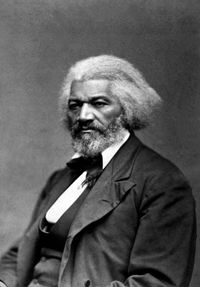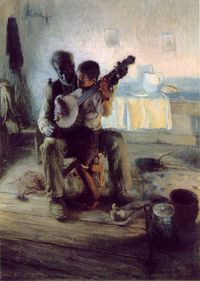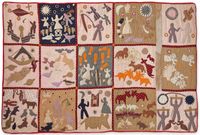"The white children could tell their ages. I could not tell why I ought to be deprived of the same privilege."
Former American President Ulysses S Grant began his quite memorable memoirs (wildly regarded by this author as the superlative of all Presidential memoirs) with an itemization of his parents, heritage, and place of birth. Two thousand years ago Marcus Aurelius began his self-reflecting Meditations with a nod to his father's legacy. We anchor our concepts of self - the person we know and present to the world - in basic things: when and where we were born and to whom.
Walt Whitman's poem "With Antecedents" begins with the lines:
with antecedents,
With my fathers and mothers and the accumulation of past ages,
With all which, had it not been, I would not now be here, as I am...
What does it feel like to not know these estimably basic things? Or to know them incompletely? Or to be denied the very means of ever knowing?
Escaped American slave and writer, abolitionist Frederick Douglass (February 1817 or February 1818 – February 20, 1895) spent his adult life trying to ascertain the identity of his father. Of the numerous heart-clenching moments of Douglass' Narrative of the Life of Frederick Douglass, Douglass's complete lack of almost any familiar knowledge is particularly disturbing. It immediately illuminates the privilege of self-knowledge and how American slaves, by the very nature of their birth and existence, were denied all such knowledge.
I was born in Tuckahoe, near Hillsborough, and about twelve miles from Easton, in Talbot county, Maryland. I have no accurate knowledge of my age, never having seen any authentic record containing it. By far the larger part of the slaves know as little of their ages as horses know of theirs, and it is the wish of most masters within my knowledge to keep their slaves thus ignorant. I do not remember to have ever met a slave who could tell of his birthday. They seldom come nearer to it than planting-time, harvest-time, cherry-time, spring-time, or fall-time. A want of information concerning my own was a source of unhappiness to me even during childhood. The white children could tell their ages. I could not tell why I ought to be deprived of the same privilege. I was not allowed to make any inquiries of my master concerning it. He deemed all such inquiries on the part of a slave improper and impertinent and evidence of a restless spirit. The nearest estimate I can give makes me now between twenty-seven and twenty-eight years of age. I come to this, from hearing my master say, some time during 1835, I was about seventeen years old.
 Frederick Douglass ca. 1879.
Frederick Douglass ca. 1879.Douglass - whose surname he chose himself - was born on a slave plantation, unnamed and unfathered (his father was a white man but exactly which white man was unknown - and, as Douglass wrote, "The means of knowing was withheld from me) and even denied a mother from early infancy.
My mother and I were separated when I was but an infant before I knew her as my mother. It is a common custom, in the part of Maryland from which I ran away, to part children from their mothers at a very early age. Frequently, before the child has reached its twelfth month, its mother is taken from it, and hired out on some farm a considerable distance off, and the child is placed under the care of an old woman, too old for field labor. For what this separation is done, I do not know, unless it is to hinder the development of the child's affection toward its mother, and to blunt and destroy the natural affection of the mother for the child. This is the inevitable result.
As Douglas continues with his personal history as known to him, we realize it is not only basic factual knowledge that was denied him, but relationships and kinships. The kind that gives us a consciousness of self, belonging, and an innate validation that our life matters to someone else.
I never saw my mother, to know her as such, more than four or five times in my life; and each of these times was very short in duration, and at night. She was hired by Mr. Stewart, who lived about twelve miles from my home. She made her journeys to see me in the night, travelling the whole distance on foot, after the performance of her day's work. She was a field hand, and a whipping is the penalty of not being in the field at sunrise unless a slave has special permission from his or her master to the contrary-a permission which they seldom get, and one that gives to him that gives it the proud name of being a kind master. I do not recollect of ever seeing my mother by the light of day. She was with me in the night. She would lie down with me, and get me to sleep, but long before I waked she was gone. Very little communication ever took place between us. Death soon ended what little we could have while she lived, and with it her hardships and suffering. She died when I was about seven years old, on one of my master's farms... Called thus suddenly away, she left me without any intimation of who my father was.
The existence of Frederick Douglass in our hearts and minds today was due to the chance that he was assiduously learned English - entirely on his own - in order to write and orate on the injustice of slavery. His Narrative was first published in 1845 and became a critical, literary work, mainly because it was clear Douglass had written it himself, not dictated to a white author. He attempted to escape slavery and was finally successful in 1838. But as fellow abolitionist Wendell Phillips noted of his friend, for Douglass as an escaped slave to announce his name, was dangerous up until the day he died. Long after slavery was abolished in America and slaves were emancipated their freedoms were not guaranteed and he was never technically "safe."
 Henry Ossawa Tanner's "The Banjo Lesson", 1893. Tanner was a celebrated and important Black American artist whose mother was an escaped slave. This famous painting - both realistic and impressionistic - depicts a very tender moment of family and connection. Learn more.
Henry Ossawa Tanner's "The Banjo Lesson", 1893. Tanner was a celebrated and important Black American artist whose mother was an escaped slave. This famous painting - both realistic and impressionistic - depicts a very tender moment of family and connection. Learn more.Some years ago, when you were beginning to tell me your real name and birthplace, you may remember I stopped you and preferred to remain ignorant of all. With the exception of a vague description, so I continued, till the other day when you read me your memoirs. I hardly knew, at the time, whether to thank you or not for the sight of them, when I reflected that it was still dangerous, in Massachusetts, for honest men to tell their names! They say the fathers, in 1776, signed the Declaration of Independence with the halter about their necks. You, too, publish your declaration of freedom with danger compassing you around. In all the broad lands which the Constitution of the United States overshadows, there is no single spot, however narrow or desolate, where a fugitive slave can plant himself and say, "I am safe."
Letter from Wendell Phillips, Esq to Frederick Douglass
Boston, April 22, 1845
 Harriet Powers' pictorial quilt, 1895, featuring both Biblical scenes including Moses, the Baptism of Jesus, and Adam and Eve, as well as a meteor shower in 1833.Learn more.
Harriet Powers' pictorial quilt, 1895, featuring both Biblical scenes including Moses, the Baptism of Jesus, and Adam and Eve, as well as a meteor shower in 1833.Learn more.Ulysses S Grant, the former President, and Civil War General lived a life that spanned almost identical years to Douglass. The two men certainly knew of one another. After he escaped slavery and settled in Massachusetts in 1837, Douglass became a major preacher and author in the Abolitionist movement. The now-married former slave was finally able to purchase his freedom with the help of his British supporters. Grant was in favor of the Abolition but like many white Northerners, not entirely pure of racism (his memoirs include a few insensitive lines which I will not include here). In 1868 Grant accepted the Republican nomination for President and finished his inaugural remarks with the line "Let us have peace."
Douglass, while supportive of the larger movement of Reconciliation that Grant would lead, pointed out in a later speech that Grant's dream of "peace" alone was inadequate.
In the language of our greatest soldier, twice honored with the Presidency of the nation, “Let us have peace.” Yes, let us have peace, but let us have liberty, law, and justice first. Let us have the Constitution, with its 13th, 14th, and 15th Amendments, fairly interpreted, faithfully executed, and cheerfully obeyed in the fullness of their spirit and the completeness of their letter.
When asked by the wartime French government how best to assimilate and support returning WWII soldiers, philosopher Simone Weil reflected on our soul's deepest need: to be rooted. This encapsulates more than mere property or ownership of materials. It means one has a homeland, a community. It means the most basic sense of chronological structure of genealogy, including but not limited to the day you were born, the name of your father, the name of your grandparents, and the location you were born. It means safety. There were so many things denied to so many people, freedom is but one of them.


